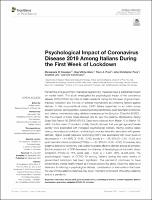Please use this identifier to cite or link to this item:
https://hdl.handle.net/20.500.12202/9910| Title: | Psychological impact of coronavirus disease 2019 among Italians during the first week of lockdown |
| Authors: | Di Giuseppe, Mariagrazia Zilcha-Mano, Sigal Prout, Tracy A. Perry, John Christopher Orrù Graziella, Graziella Conversano, Ciro 0000-0002-3650-5890 |
| Keywords: | *Defense Mechanisms *Distress *Mental Health *Posttraumatic Stress *COVID-19 Homebound Pandemics Psychological Consequence |
| Issue Date: | 30-Aug-2020 |
| Publisher: | Frontiers |
| Citation: | Di Giuseppe, M., Perry, J. C., Zilcha-Mano, S., & Prout, T. A. (2020). Psychological impact of COVID-19 among Italians during the first week of lockdown. Frontiers in Psychology. |
| Series/Report no.: | Frontiers in Psychology.;11 |
| Abstract: | Pandemics and government-mandated quarantining measures have a substantial impact on mental health. This study investigated the psychological impact of the coronavirus disease 2019 (COVID-19) crisis on Italian residents during the first week of government-imposed lockdown and the role of defense mechanisms as protective factors against distress. In this cross-sectional study, 5,683 Italians responded to an online survey assessing socio-demographics, overall psychological distress, post-traumatic symptoms, and defense mechanisms using validated measures as the Symptom Checklist-90 (SCL-90), the Impact of Event Scale-Revised (IES-R), and the Defense Mechanisms Rating Scale-Self-Report-30 (DMRS-SR-30). Data were collected from March 13 to March 18, within the first week of lockdown in Italy. Results showed that younger age and female gender were associated with increased psychological distress. Having positive cases nearby, more days on lockdown, and having to relocate were also associated with greater distress. Higher overall defensive functioning (ODF) was associated with lower levels of depression (r = −.44, 95% CI −0.48, −0.40), anxiety (r = −.38, 95% CI −0.42, −0.35), and post-traumatic stress symptoms (PTSS) (r = −.34, 95% CI −0.38, −0.30). Conversely, less adaptive defensive functioning was related to greater affective distress across all domains. Each increased unit of ODF decreased the chances of developing post-traumatic stress symptoms (PTSS) by 71% (odds ratio = 0.29, p < 0.001, 95% CI.026,.032). The psychological impact of COVID-19 among Italians during the early weeks of government lockdown has been significant. The pandemic continues to have extraordinary mental health impact as it moves across the globe. Given the salience of defensive functioning in psychological distress, consideration of interventions that foster the use of more adaptive defenses may be an important component of building resilience amidst a pandemic. |
| Description: | Research article / Open accss |
| URI: | https://hdl.handle.net/20.500.12202/9910 |
| ISSN: | 1664-0640 (Electronic) |
| Appears in Collections: | Ferkauf Graduate School of Psychology: Faculty Publications |
Files in This Item:
| File | Description | Size | Format | |
|---|---|---|---|---|
| Prout 2020 OA Di Giuseppe Psychological impact of covid-19.pdf | 382.65 kB | Adobe PDF |  View/Open |
This item is licensed under a Creative Commons License

